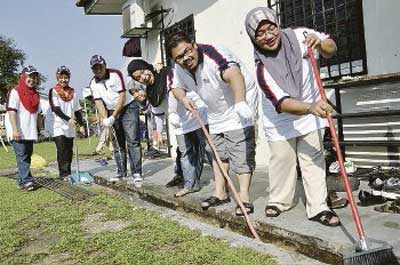Matters of the heart
New Sunday Times - 01/23/2011
HIGHER Education Minister Datuk Seri Mohamed Khaled Nordin gave his annual address to a gathering of administrators, academics and students last week with a reminder that we are now in the second phase of the Ministry's Strategic Plan to transform the milieu of higher education in Malaysia.
It is now about "strengthening and enhancing" after "laying the foundation".
While the former recognises that there is "refinement" that is required of the "institutional pillars" and "critical agenda" set forth throughout the phases of transformation up to 2020 and beyond, it also emphasises the need to "deliver excellence" beginning this year and for the period of the 10th Malaysia Plan. This is the time to translate some of the "investment" made last year to bring out "real" impact to society as outlined in several recently launched transformation documents, which cut across public and private sectors, all within the framework of "People First".

Undergraduates help to clean the grounds of a surau in Bangi.
It is time to make an impact on society within the framework
of ‘People First’
Being at the forefront of education, knowledge becomes the levers to ensure that the cause of humanity be best served; shaping the leaders of tomorrow. We were reminded that universities must be held accountable, and the Ministry spoke directly to vice- chancellors in outlining some of the expectations.
For the first time, there is a categorical call that vice-chancellors must be "brave" to make changes that are necessary for universities to go beyond national borders.
And this means that their leadership must be recognised and held in high regard at the international level too. Gone are the days when university leaders assume a mere caretaker role of maintaining (or pandering to) the status quo in the interest of self-preservation (read: to ensure their appointments are extended) by making cosmetic changes of no academic and intellectual significance.
After all, transformation is not about playing safe but taking calculated risks to bring about the desired changes to the status quo, knowing full well that the same situation, in all its disguises, will come back with a vengeance!
The Minister aptly used the word "rejuvenation" to describe the process of internalizing, once again, the "true" academic culture, which is uncompromising on the "people first" principle. "Commitment to seek the truth has been the raison d'être for the university" was the refreshing reminder. The special mention of the Students' Parliament initiative pioneered by Universiti Sains Malaysia (USM) student body as worthy of emulation is a good indication that the rejuvenation mindset is raring to go. It is now up to the universities or the relevant organisations to set the pace for rejuvenation to take place immediately.
It is more important to realise that where "truth" matters, so do sacrifices. If the latter is lacking, the former often remains hidden by a variety of subtle manoeuvres that paint a false picture of the situation. Among this is the "know-who" syndrome that takes precedence over "know-what". This cannot be over-emphasised because sacrifices are matters of the heart that no amount of money can buy. If academics are to subscribe to the notion that the university is the jantung negara (heart of the nation) as rightly suggested by the Minister, then we must be concerned with the notion of "heartlessness" as an antithesis of the "people first" principle and university educational ethos as well.
The seeds of sacrifice must then be sown at the universities, especially in the context of building a culture rooted in altruism and selflessness as clear manifestations of a good and pure heart - the abode of sincerity. Yet you wonder if the "heart" is part of the much touted human capital development; and if so, where does it factor into the programme so far. In other words, do the various advocated transformational processes include the transformation of the heart? Or better still, start with the heart!
As it stands today, unfortunately, this has not been given sufficient attention as the focus is on tangibles (an argument that I have made many times in this column). If the intention is "to put the best brain to work together as a team" as proposed during the address, other virtues, such as trust and trustworthiness must also be nurtured as well, and we have to rely on the state of heart yet again.
In short, in taking the "strengthening and enhancing" phase to heart, emphasis of the tangible such as Key Performance Indexes alone would not be sufficient without an equal stress on the importance of virtues such as Key Intangible Performances.
* The writer is the Vice-Chancellor of Universiti Sains Malaysia. He can be contacted at vc@usm.my
